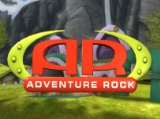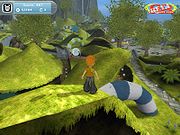
Adventure Rock
Encyclopedia
Gameplay

The game starts with a tutorial in which Cody teaches the player how to control the avatar. Following that, the player is 'dropped' onto Adventure Rock, and is free to explore. There are a number of continuous tasks to do, such as collecting the hundreds of cog-shaped tokens, or pages torn from a book, the purpose of which is currently unknown. In doing these, the player gains points. There are also a number of different 'studios', including an art studio, a music studio and an animation studio, in which the player can create their own animations etc. which can then be submitted to CBBC
CBBC
CBBC is one of two brand names used for the BBC's children's television strands. Between 1985 and 2002, CBBC was the name given to all the BBC's programmes on TV for children aged under 14...
.
There are a number of areas which are currently (June 2008) closed off, such as a Rollercoaster. It is expected that these will be 'released' over time, in a similar fashion to an MMO
Massively multiplayer online game
A massively multiplayer online game is a multiplayer video game which is capable of supporting hundreds or thousands of players simultaneously. By necessity, they are played on the Internet, and usually feature at least one persistent world. They are, however, not necessarily games played on...
game.
Story
The game is based around a story narrated on the Adventure Rock website. The story section of the website states that:The website then continues in the style of a blog written by the hosts sent to explore the world, detailing various discoveries made by the hosts. The blog goes on to detail how the hosts are returning to the studio to examine the pages found, and that they need more help, and will hence be sending in CBBC users to investigate further.
Research
Adventure Rock is the subject of a year-long joint research project between CBBCCBBC
CBBC is one of two brand names used for the BBC's children's television strands. Between 1985 and 2002, CBBC was the name given to all the BBC's programmes on TV for children aged under 14...
and the University of Westminster
University of Westminster
The University of Westminster is a public research university located in London, United Kingdom. Its origins go back to the foundation of the Royal Polytechnic Institution in 1838, and it was awarded university status in 1992.The university's headquarters and original campus are based on Regent...
, funded by BBC Future Media and Technology, and the Arts and Humanities Research Council
Arts and Humanities Research Council
Established in April 2005 as successor to the Arts and Humanities Research Board, the Arts and Humanities Research Council is a British Research Council and non-departmental public body that provides approximately £102 million from the Government to support research and postgraduate study in the...
which began in July 2007, and aims to look at how children engage with virtual worlds. It is the first time the BBC has run a structured commissioning round calling for research in partnership with academia. Adventure Rock will be studied from both an audience and producer’s point of view, with the hope of finding out how children create imaginary places and spaces in the real world, how children wish Adventure Rock to develop, how producers should adapt the way they engage with children around the Adventure Rock ‘brand’ (which includes the service, website, message boards etc.) and what parents think of Adventure Rock (specifically whether the service changes their perception of Adventure Rock and/or virtual worlds in general).
The project will also study why the BBC chose to make Adventure Rock a closed world where users' avatars cannot meet or communicate, and what children think of this.
Research workshops have already taken place in December 2007 and January 2008, with 75 participants aged 7-11 years, in five mixed socio-economic and ethnic groups located in Scotland, Wales, N Ireland, and England. At this workshop the children were asked to talk about imaginary spaces and places, and suggest what they would like to see in a virtual world. Six weeks later, during which the children were asked to explore Adventure Rock, a second workshop was held in which the children made creative suggestions about what they would add or remove from this virtual place. Parents were asked to complete a questionnaire regarding their feelings about their children participating in this virtual world. In addition, a researcher spent time observing the producers and hosts of CBBC, completing a detailed research diary, which was then used to note congruencies and disparities between producers' expectations and children's own responses.
The findings have been presented at the Conference on Virtual Worlds for Children, on 23 May 2008.

